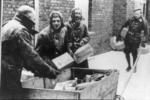Red Cross food parcels being distributed at an Oflag camp
Production date
1939-1945
Audio tour
See full details
Details
Description
This is a photograph of four men holding Red Cross parcels. Unfortunately, we don’t know their names. But we do know that they are in an Oflag camp. Oflag or Offizierslager was a type of German prisoner of war camp for officers. This photograph raises many questions as we also don’t know how long these men were imprisoned in this camp. There are other photographs within the collection where we can identify the camp but here all we know is that these men must have been in this camp during the winter months as there is a layer of snow on their coats. If you closely you can also see snow on the ground. These four men must have been Allied officers who were captured by the German Army during the Second World War. These men were therefore prisoners of war – POWs.
Oflag camps were established during the First World War in accordance with the requirements of the (1899/1907) Hague Convention, and in the Second World War in accordance with the requirements of the Geneva Convention (1929). The Red Cross sent food parcels to these camps to be distributed to the POWs. We don’t know who received the parcels in this photograph. We also don’t know how these four POWs were treated in the camp but we do know that conditions were generally challenging in POW camps. Some POWs kept diaries and tried to keep active in the camps by playing football and cricket.
The Prisoners of War Department was responsible for packing and dispatching parcels to British POWs. British Red Cross food parcels played a vital role in helping to keep prisoners alive. They also reminded them of home and connected them to their families who were extremely worried about them.
The distribution of food parcels was an international effort as the British Red Cross parcels were sent to Switzerland where the International Committee of the Red Cross arranged for them to be transported to POW camps. While some Oflag camps received parcels not all did.
This object is a snapshot of a moment in time where help was provided and this is why I feel that this object should be included in the British Red Cross’ 150 items to commemorate its long history of humanitarian aid. It is an intriguing object because while it shows the incarceration of human beings, their freedom stripped away, there is a glimmer of hope because these Red Cross food parcels were a lifeline for the POWs. A small act of kindness can go a long way. I wonder if these men survived the war and if they told their stories.
Audio recording by Dr Amy Williams (Volunteer), Birmingham.
Oflag camps were established during the First World War in accordance with the requirements of the (1899/1907) Hague Convention, and in the Second World War in accordance with the requirements of the Geneva Convention (1929). The Red Cross sent food parcels to these camps to be distributed to the POWs. We don’t know who received the parcels in this photograph. We also don’t know how these four POWs were treated in the camp but we do know that conditions were generally challenging in POW camps. Some POWs kept diaries and tried to keep active in the camps by playing football and cricket.
The Prisoners of War Department was responsible for packing and dispatching parcels to British POWs. British Red Cross food parcels played a vital role in helping to keep prisoners alive. They also reminded them of home and connected them to their families who were extremely worried about them.
The distribution of food parcels was an international effort as the British Red Cross parcels were sent to Switzerland where the International Committee of the Red Cross arranged for them to be transported to POW camps. While some Oflag camps received parcels not all did.
This object is a snapshot of a moment in time where help was provided and this is why I feel that this object should be included in the British Red Cross’ 150 items to commemorate its long history of humanitarian aid. It is an intriguing object because while it shows the incarceration of human beings, their freedom stripped away, there is a glimmer of hope because these Red Cross food parcels were a lifeline for the POWs. A small act of kindness can go a long way. I wonder if these men survived the war and if they told their stories.
Audio recording by Dr Amy Williams (Volunteer), Birmingham.
Collection Type
Archives
Level of Current Record
item
Catalogue Number
IN0433
Subject auto tags
Part of 1 highlight set
Share
All images are the property of the British Red Cross Museum and Archives (unless otherwise indicated), and cannot be used without permission. For queries about permission to use images, please contact enquiry@redcross.org.uk.


-1%20(002).jpg)